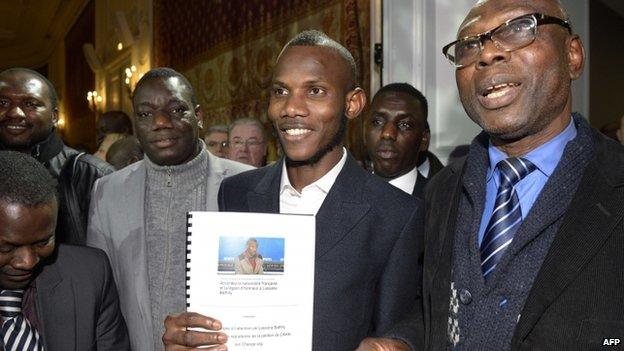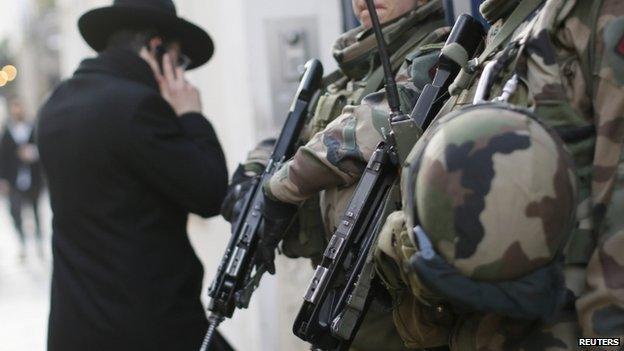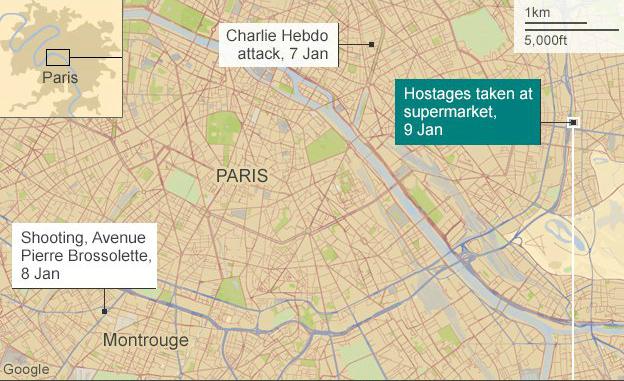France attacks: 'Hero' Lassana Bathily gets citizenship
- Published
Lassana Bathily was awarded French citizenship by French Prime Minister Manuel Valls and Interior Minister Bernard Cazeneuve
A Malian-born Muslim employee who hid customers from an Islamist gunman at a Paris kosher supermarket this month has been granted French nationality.
Lassana Bathily, 24, was in a stockroom when gunman Amedy Coulibaly burst in, killing four people.
At a ceremony attended by top French ministers, Mr Bathily said he was "proud and moved" to become a citizen.
The attacks in Paris killed 17 people, most of them at the offices of the Charlie Hebdo satirical magazine.
Mr Bathily's efforts came to light when he sneaked out and told his story after hiding people in a cold store room during the assault by Coulibaly.
"People say I'm a hero but I'm not a hero. I'm Lassana," he said at the ceremony.

Mr Bathily was handed a letter from the president, a passport and a medal at a ceremony
"I'll stay the same. I would do the same again, because I was following my heart."
French Prime Minister Manuel Valls and Interior Minister Bernard Cazeneuve spoke at the citizenship event, thanking him for his bravery.
Mr Bathily has lived in France for the past nine years and applied for citizenship last year.
Meanwhile, Paris officials say they plan to sue US channel Fox News for a broadcast saying there were "no-go zones" in the French capital for non-Muslims.
Fox News has apologised for the reports but the Paris Mayor, Anne Hidalgo, told CNN her city had been "insulted".
Lassana Bathily: "I switched off the fridge... and told customers to stay calm"
'Social apartheid'
In other developments, four men appeared in a Paris court suspected of providing Coulibaly with weapons and vehicles.
They are the first to face charges over the attacks.
Prosecutors have asked for the men to be detained longer and charged on terrorism charges. Their exact role in the attacks is unclear.
Earlier on Tuesday, five Chechens were arrested in southern France on suspicion of possessing explosives.
The men were not known to terrorism officers and a prosecutor warned not to "jump to conclusions".

Almost 15,000 extra police and troops have been mobilised to boost security since the attacks
Prime Minister Valls said the attacks highlighted deep divisions in French society, a "territorial, social and ethnic apartheid that has imposed itself on our country".
Three days of violence began in Paris on 7 January when brothers Cherif and Said Kouachi burst into the offices of Charlie Hebdo, killing 12 people.
Coulibaly killed four Jewish hostages on 9 January before being shot dead by police. He is also believed to have shot dead a policewoman the day before.
Almost 15,000 extra police and troops have been mobilised to boost security across France since the attacks.

How the attacks unfolded (all times GMT)

Wednesday 7 January 10:30 - Two masked gunmen enter Charlie Hebdo offices, killing 11 people, including the magazine's editor. Shortly after the attack, the gunmen kill a police officer nearby.
11:00 - Police lose track of the men after they abandon their getaway car and hijack another vehicle. They are later identified as brothers Said and Cherif Kouachi.
Thursday 8 January 08:45 - A lone gunman shoots dead a policewoman and injures a man in the south of Paris. Gunman later identified as Amedy Coulibaly.
10:30 - The Kouachi brothers rob a service station near Villers-Cotterets, in the Aisne region, but disappear again.
Friday 9 January 08:30 - Police exchange gunfire with the Kouachi brothers during a car chase on the National 2 highway northeast of Paris.
10:00 - Police surround the brothers at an industrial building in at Dammartin-en-Goele, 35km (22 miles) from Paris.
12:15 - Coulibaly reappears and takes several people hostage at a kosher supermarket in eastern Paris. Heavily-armed police arrive and surround the store.
16:00 - Kouachi brothers come out of the warehouse, firing at police. They are both shot dead.
16:15 - Police storm the kosher supermarket in Paris, killing Coulibaly and rescuing 15 hostages. The bodies of four hostages are recovered.